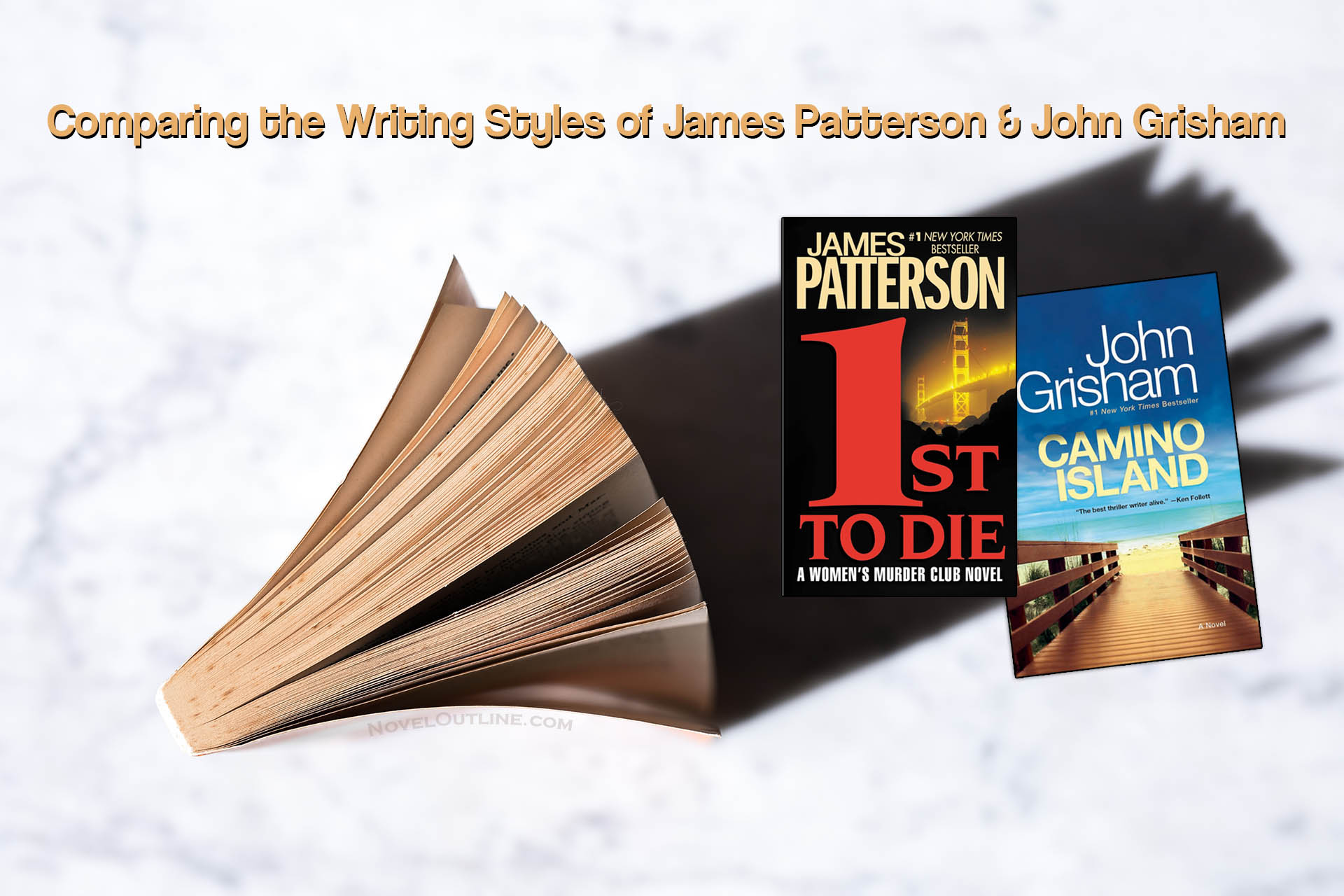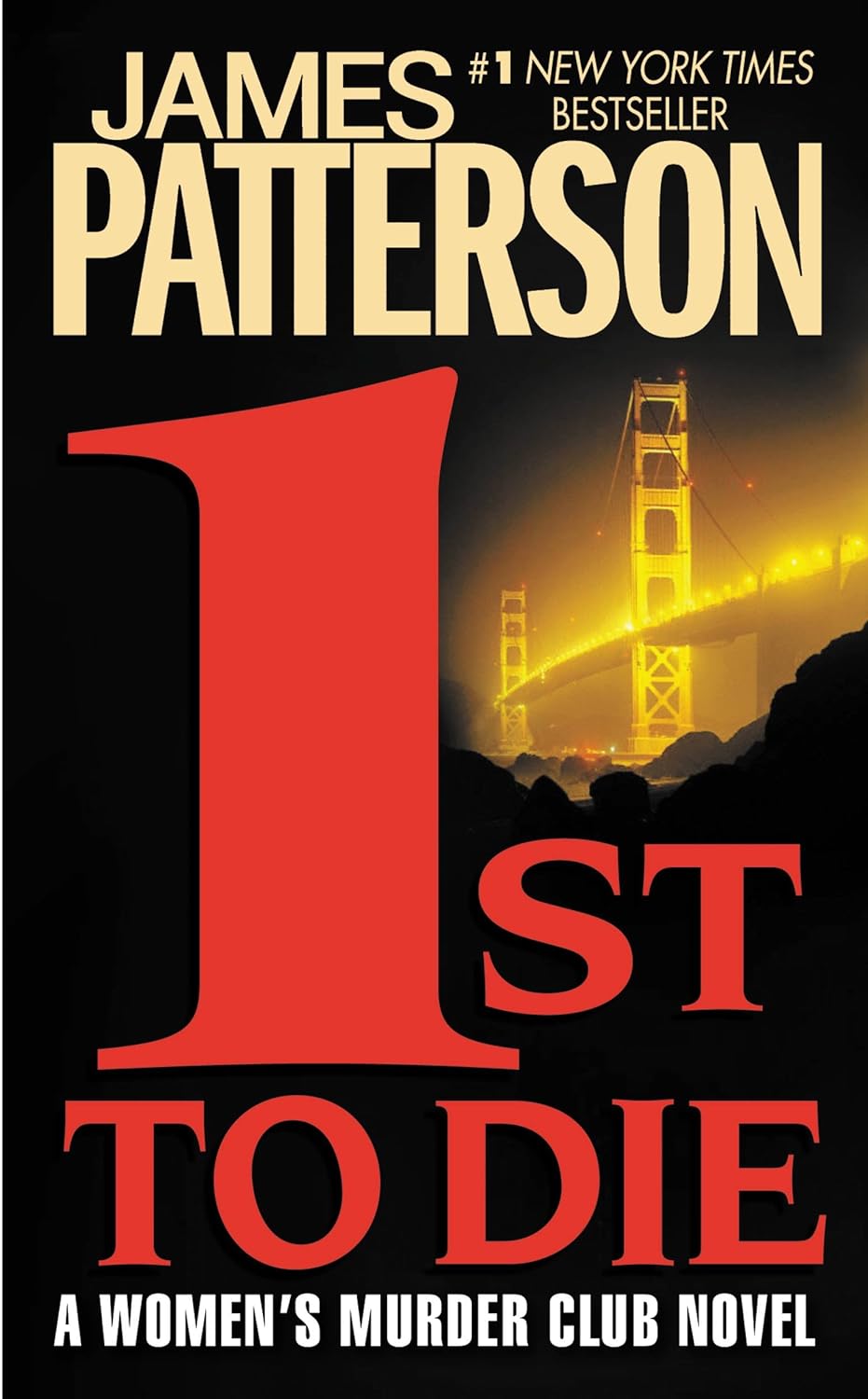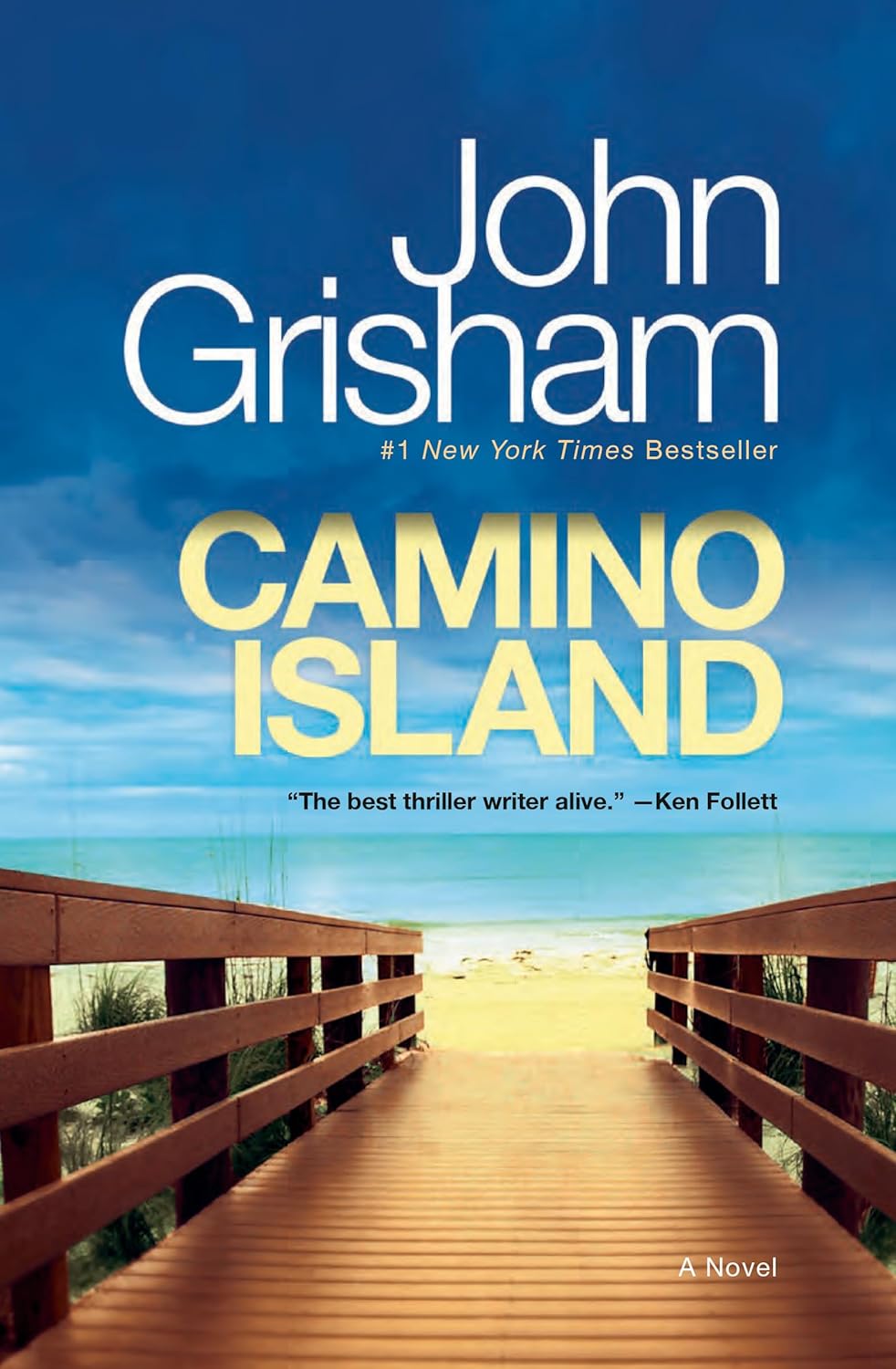Studying an author’s writing style is a great way to find your own voice or, more specifically, how you want what you have to say or hear. A writer’s style shapes the overall feel and impact of their writing, distinguishing it from the styles of other authors and contributing to the richness and depth of their storytelling.
Two people recounting an identical tale can evoke starkly contrasting impressions solely due to the manner in which the author crafts their narrative – their unique ‘style’ wields a profound influence.
So, let’s take a closer look at the writing styles of two heavy hitters.
Few names loom as large as James Patterson and John Grisham in the realm of popular fiction. Both masters of the written word, Patterson and Grisham, have carved out their niches in the literary landscape with their gripping narratives and captivating storytelling.
While James Patterson and John Grisham may employ different techniques and approaches in their writing, both authors share a common goal: to captivate and enthrall readers with their tales of suspense and intrigue.
Yet, beneath the surface of their shared success lie two distinct writing styles, each marked by its own set of characteristics and flourishes. Let’s delve into the world of these two literary giants and explore the nuances of their craft.
James Patterson: Crafting Intimate Thrills
James Patterson, the prolific author behind such bestsellers as the Alex Cross and Women’s Murder Club series, is celebrated for his ability to keep readers on the edge of their seats. At the heart of Patterson’s writing style lies a commitment to immediacy and intimacy, drawing readers into the minds and hearts of his characters from the very first page.
First and foremost, Patterson’s penchant for the first-person perspective imbues his narratives with a sense of intimacy and urgency. By allowing readers to experience the story through the eyes of his protagonists, Patterson creates an emotional connection that resonates long after the final page is turned.
In addition to his narrative choices, Patterson’s writing is characterized by its brisk pace and punchy prose. Short, snappy sentences propel the action forward, while sharp dialogue crackles with tension and wit. Patterson’s skillful use of foreshadowing adds an extra layer of intrigue, keeping readers guessing until the very end.
Perhaps most notably, Patterson’s collaborative approach to writing sets him apart from his peers. By partnering with co-authors across a wide range of genres, Patterson is able to produce an astonishing volume of work while maintaining a consistent level of quality and craftsmanship.
John Grisham: Crafting Legal Drama with Precision
In contrast to Patterson’s fast-paced thrillers, John Grisham’s writing style is marked by its meticulous attention to detail and its exploration of moral and ethical dilemmas. With a background in law, Grisham brings a wealth of expertise to his legal thrillers, infusing his narratives with authenticity and depth.
Central to Grisham’s writing is his use of clear, direct language that eschews unnecessary complexity in favor of clarity and accessibility. This straightforward approach allows readers to navigate the intricacies of legal proceedings and courtroom drama with ease, immersing themselves fully in the world of Grisham’s creation.
Moreover, Grisham’s novels often feature multiple perspectives, offering insight into the motivations and actions of a diverse cast of characters. By shifting between viewpoints, Grisham enriches his narratives with complexity and depth, inviting readers to see the story from multiple angles.
Grisham’s writing is also distinguished by its exploration of moral and ethical themes, particularly those related to the legal profession. Through his characters’ struggles and dilemmas, Grisham raises thought-provoking questions about justice, integrity, and the nature of the law itself.
Let’s have AI show us something fun.
I thought it might be fun to take “Letter 1” from Mary Shelley’s Frankenstein and rewrite it in the style of James Patterson and then again in the style of John Grisham so you can see what a big difference a writing style really makes.
James Patterson’s Version
Hey there, Mrs. Saville,
Hope this letter finds you well and cheerful back in England. I’m thrilled to report that things are off to a solid start with the mission you were so worried about. Just got into St. Petersburg yesterday, and my first order of business is to drop you a line, my dear sister, and let you know I’m doing just fine, thank you very much, and feeling pretty darn good about this whole venture.
Right now, I’m way up north of London, taking in the chilly breeze of Petersburgh’s streets. There’s something invigorating about that cold wind brushing against my face, you know? It’s like a little preview of the icy lands ahead. And let me tell you, Margaret, it’s got me fired up. I can almost taste the adventure waiting for me out there.
I know what you’re thinking – the pole’s all about frost and gloom, right? But not in my head. In my mind’s eye, it’s all sunshine and beauty up there. Picture this: the sun hanging low on the horizon, casting this gorgeous light that never fades. And let’s not forget, according to those who’ve sailed these waters before, there’s a whole world of wonders waiting to be discovered up there – stuff we’ve never even dreamed of. I’m talking about a land where snow and frost are just distant memories, and where the sea is calm and welcoming. And me? I’m gonna be the first to set foot on that pristine land, to leave my mark where no man has ever trod before.
Those are the thoughts that keep me going, Margaret. They’re the reason I’m not afraid to take on whatever challenges lie ahead. Because, let’s face it, this ain’t gonna be a walk in the park. But hey, I’ve never been one to shy away from a challenge.
You know, this whole adventure has been brewing in my mind for years now. I can still remember the exact moment I made up my mind to go for it. It was like a switch flipped inside me, and I knew I had to see this thing through to the end. Ever since then, I’ve been preparing myself for whatever might come my way. I’ve braved the cold and the hunger, worked my butt off alongside seasoned sailors, and soaked up every bit of knowledge I could get my hands on. And you know what? It’s paid off. I’ve earned the respect of my crewmates, and I’ve got the skills to tackle whatever challenges come my way.
So, Mrs. Saville, do you think I’ve got what it takes to pull this off? I sure hope so. Because let me tell you, I’m all in on this one. No turning back now.
Well, that’s about all for now. I’ll be hitting the road soon, making my way to Archangel to find a ship and crew to take me further north. When will I be back? Ah, now there’s a question. If all goes well, it could be months, maybe even years, before I set foot on English soil again. But if things don’t go according to plan, well, who knows?
Take care, Mrs. Saville. Thanks for always being there for me, no matter what. You’re the best sister a guy could ask for.
Your loving brother, R. Walton
John Grisham’s Version
Dear Mrs. Saville,
I trust this missive finds you in good spirits across the channel. Allow me to impart some promising news: the outset of my latest venture bears no ill omens, contrary to your apprehensions. Having arrived in St. Petersburg just yesterday, I am compelled to assure my dear sister of my well-being and burgeoning confidence in the success of my endeavor.
Presently, I find myself well beyond the confines of London, wandering the streets of Petersburg. The brisk northern breeze that brushes against my cheeks fills me with an exhilarating sense of anticipation. Can you fathom this sensation? It’s as if this very wind, journeying from the lands I now approach, offers a prelude to the icy realms ahead. Emboldened by this harbinger of promise, my reveries take on a renewed fervor and vividness. Despite common belief in the pole’s frigid and desolate nature, I cannot shake the vision of it as a realm of unparalleled beauty and splendor. In that distant land, Margaret, the sun holds perpetual sway, casting its radiant glow along the horizon. It is a place where snow and frost are mere specters, and where calm seas may ferry us to vistas more wondrous and sublime than any hitherto beheld. Imagine the possibilities, my dear sister! There, amidst eternal light, I may uncover the mysteries of the compass and unlock celestial secrets that have eluded mankind for eons. Even if these conjectures prove false, can you deny the invaluable boon my discoveries may bestow upon humanity? A passage near the pole, shortening arduous voyages by months; or the unraveling of the enigma of magnetism, a feat attainable only through endeavors such as mine.
These musings have allayed the trepidation that initially gripped me, filling my heart with an enthusiasm that verges on the divine. Nothing offers solace to the soul like a steadfast purpose—a beacon upon which the intellect may fix its gaze. This expedition has long been the cherished dream of my youth. Immersing myself in the accounts of intrepid voyages to the North Pacific Ocean, chronicled within the tomes of our esteemed Uncle Thomas’ library, fueled my passion for exploration. Though my education was regrettably neglected, my fervent love for reading was unabated. Those volumes became my constant companions, heightening the regret I felt upon learning that my father’s parting wish had thwarted my aspirations for a seafaring life.
Yet, my dreams foundered upon the rocks of reality when I discovered the works of poets whose verses transported my soul to celestial heights. Yearning for a place among the literary titans, I embarked on a futile quest that ultimately ended in disappointment. Fortuitously, an unexpected inheritance redirected my thoughts toward the pursuits of my youth.
Six years have elapsed since I resolved to embark upon this grand enterprise. I distinctly recall the moment when I dedicated myself to this noble endeavor. My preparations began in earnest, with rigorous physical training and the pursuit of knowledge in various disciplines. From the freezing waters of the North Sea to the hallowed halls of learning, I honed my skills, earning the respect of seasoned sailors and scholars alike.
And now, dear Margaret, do I not deserve to achieve some noble purpose? Though my life could have been one of leisure and luxury, I chose the path of glory over the temptations of wealth. Yet, despite my unwavering resolve, doubts assail me, and my spirits often waver. I stand poised on the precipice of a perilous voyage, one that will test not only my courage but also my resilience.
The time is ripe for travel in Russia, where sledges swiftly traverse the snow-clad landscape. Unlike the bone-chilling cold of an English winter, the frigid air is bearable when clad in fur. I harbor no desire to perish on the post-road between St. Petersburg and Archangel.
Within a fortnight or three weeks, I shall depart for the latter town. There, I intend to secure a vessel and enlist a crew, drawn from the ranks of seasoned whale-fishers. Though the voyage is slated to commence in June, the prospect of my return remains uncertain. Should fortune favor me, many months, perhaps years, will elapse before we are reunited. Should misfortune befall me, our parting may prove permanent.
Farewell, my dear, esteemed Margaret. May heaven bestow its blessings upon you, and may I live to express my gratitude for your unwavering love and kindness.
With affection, R. Walton
Comparing The Greats
While both authors are known for their gripping narratives, their writing styles diverge in several key aspects. James Patterson often employs a first-person perspective, providing readers with intimate access to his protagonist’s thoughts and emotions. In contrast, John Grisham tends to utilize a third-person omniscient viewpoint, allowing for a broader exploration of multiple characters’ perspectives within the narrative.
Similarities:
Both Patterson and Grisham excel in creating immersive worlds and compelling characters that resonate with readers. They share a talent for crafting suspenseful plots that keep audiences eagerly turning pages until the very end. Additionally, both authors demonstrate a mastery of dialogue, using it to reveal character motivations, drive the plot forward, and heighten tension in key moments.
Differences:
While both authors are known for their gripping narratives, their writing styles diverge in several key aspects. James Patterson often employs a first-person perspective, providing readers with intimate access to his protagonist’s thoughts and emotions. In contrast, John Grisham tends to utilize a third-person omniscient viewpoint, allowing for a broader exploration of multiple characters’ perspectives within the narrative.
Patterson’s prose tends to be characterized by short, punchy sentences and a conversational tone, creating a brisk pace that propels the reader forward. On the other hand, Grisham’s writing is marked by detailed descriptions and clear, direct language, reflecting his background in law and adding authenticity to his legal thrillers.
Furthermore, Patterson’s collaborative approach to writing sets him apart, often working with co-authors to produce a high volume of work across various genres. In contrast, Grisham typically writes solo, drawing on his own experiences and expertise to craft intricate legal dramas that delve into moral and ethical dilemmas.
In essence, while both authors share a talent for crafting gripping narratives, their unique writing styles offer readers distinct experiences, each with its own merits and appeal.
Whether you find yourself drawn to Patterson’s breakneck pace and intimate narratives or Grisham’s meticulous attention to detail and moral complexity, one thing is certain: in the world of thriller fiction, there’s something for everyone.





